Related Research Articles

The territory of Chile has been populated since at least 3000 BC. By the 16th century, Spanish invaders began to raid the region of present-day Chile, and the territory was a colony from 1540 to 1818, when it gained independence from Spain. The country's economic development was successively marked by the export of first agricultural produce, then saltpeter and later copper. The wealth of raw materials led to an economic upturn, but also led to dependency, and even wars with neighboring states. Chile was governed during most of its first 150 years of independence by different forms of restricted government, where the electorate was carefully vetted and controlled by an elite.

Juan Antonio Ríos Morales was a Chilean political figure who served as president of Chile from 1942 to 1946, during the height of World War II. He died in office.
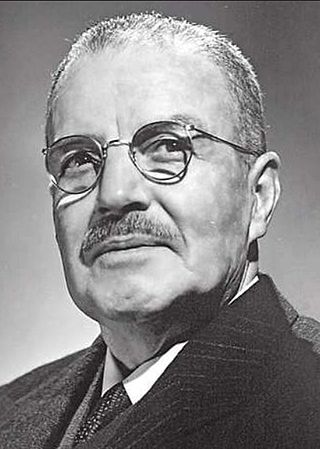
General Carlos Ibáñez del Campo was a Chilean Army officer and political figure. He served as President twice, first between 1927 and 1931, and then from 1952 to 1958, serving for 10 years in office.

José Manuel Emiliano Balmaceda Fernández served as the 10th President of Chile from September 18, 1886, to August 29, 1891. Balmaceda was part of the Castilian-Basque aristocracy in Chile. While he was president, his political disagreements with the Chilean congress led to the 1891 Chilean Civil War, following which he shot and killed himself.
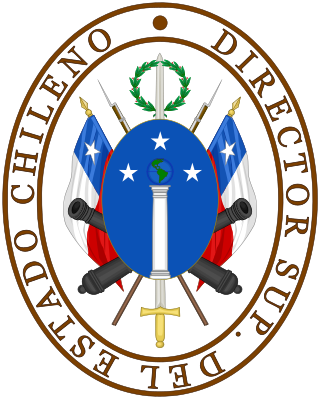
The Supreme Director of Chile was the Head of State and of Government of Chile in the periods of 1814 and 1817-1826.

The Chilean War of Independence was a military and political event that allowed the emancipation of Chile from the Spanish Monarchy, ending the colonial period and initiating the formation of an independent republic.

A constitutional referendum was held in Chile on 11 September 1980. The proposed new constitution would replace the 1925 constitution, and was approved by over two-thirds of voters.

The Chilean Civil War of 1829–1830 was a civil war in Chile fought between conservative Pelucones and liberal Pipiolos forces over the constitutional regime in force. This conflict ended with the defeat of the liberal forces and the approval of a new constitution in 1833, that was in force until 1925.
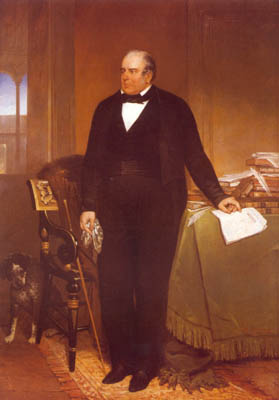
José Miguel Infante y Rojas was a Chilean statesman and political figure. He served several times as deputy and minister, and was the force behind the Federalist movement in that country.

The Socialist Republic of Chile was a short-lived political entity in Chile, that was proclaimed by the Government Junta that took over that year.
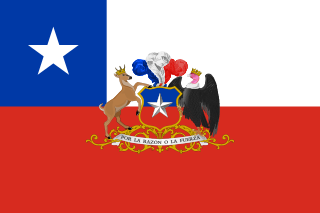
The president of Chile, officially the president of the Republic of Chile, is the head of state and head of government of the Republic of Chile. The president is responsible for both government administration and state administration. Although its role and significance have changed over time, and its position and relations with other actors in the national political organization have also evolved, it remains one of the most prominent political offices in the country. It is also considered one of the key institutions that form the "Historic Constitution of Chile," and is crucial to the country's political stability.

The Ministry of National Defense is the cabinet-level administrative office in charge of "maintaining the independence and sovereignty" of Chile. It is also charged with planning, directing, coordinating, executing, controlling and informing the defense policies formulated by the President of Chile. The minister supervises all the Chilean armed forces. It is Chile's ministry of defence.

The president of the Chamber of Deputies of Chile is the highest authority of the Chamber of Deputies of Chile. The office was established in 1811 by the First National Congress of Chile.

The Constitution of 1925 was the constitution in force in Chile between 1925 and 1973 when the Government Junta suspended it. In the 1920s Chile had a severe social and economic crisis that led to the loss of prestige for old ruling class, labeled oligarchy in Chilean historiography, and the rise of a more sensibilized populist government led by Arturo Alessandri. In 1924 Alessandri was outed in a coup, but was called back in 1925 to complete his mandate. Alessandri then used his presidency to draft a new constitution to replace the Constitution of 1833. The constitution was approved by plebiscite by 134,421 voters on August 30 of 1925. Prominent features of the constitution were:
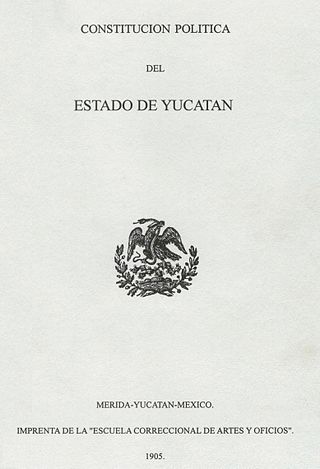
The Political Constitution of the State of Yucatán is the constitution which legally governs the free and sovereign state of Yucatán, one of the 32 federative entities of the United Mexican States. It was drafted by the Constituent Congress of State, chaired by Héctor Victoria Aguilar in 1918 and promulgated by General Salvador Alvarado, pre-constitutional governor of Yucatán. The most important reforms were made in 1938, although its text has been revised and partially renovated over the 20th century and continues to be reformed so far.
The Grand Lodge of Chile is a regular Masonic body in Chile founded on May 24, 1862. The earthquake of 1906 destroyed the original headquarters and the archives of the Grand Lodge, which determined its definitive transfer to Santiago, settling in the Club de la República.

The Constitution of Costa Rica is the supreme law of Costa Rica. At the end of the 1948 Costa Rican Civil War, José Figueres Ferrer oversaw the Costa Rican Constitutional Assembly, which drafted the document. It was approved on 1949 November 7. Several older constitutions had been in effect starting from 1812, with the most recent former constitution ratified in 1871. The Costa Rican Constitution is remarkable in that in its Article 12 abolished the Costa Rican military, making it the second nation after Japan to do so by law. Another unusual clause is an amendment asserting the right to live in a healthy natural environment.
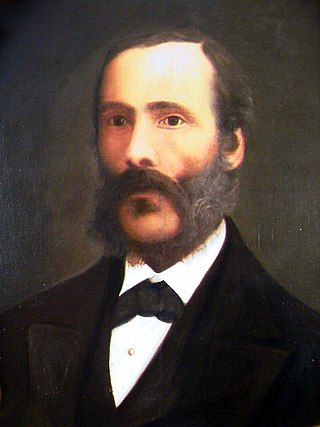
The Political Constitution of Costa Rica of 1859 was issued on December 27.1 It was in force until November 1, 1868 and also, partially, from August to October 1870..

The Organization of the Republic is the period of the history of Chile that occurred between the abdication of Bernardo O'Higgins, on January 28, 1823, and the promulgation of the Conservative Constitution, on May 25, 1833.
The National Popular Party (PANAPO) was a Chilean right-wing political party, with nationalist tendencies, that existed between 1958 and 1963.
References
- ↑ Bizzarro 2005, p. 63.
- ↑ "Chile, national: Provisions for the Constitution (1812)". The Rise of Modern Constitutionalism (1776–1849). Retrieved 11 November 2016.
- ↑ Collier & Sater 2004, p. 35.
- 1 2 Bizzarro 2005, p. 178.
- ↑ Collier & Sater 2004, p. 46-47.
- ↑ Collier & Sater 2004, p. 47-48.
- ↑ "Chilean voters overwhelmingly reject proposed leftist constitution".
